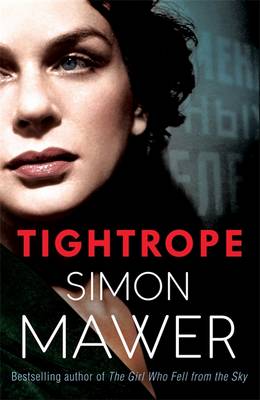
|
Tightrope - the first chapterEncounter with a GhostI hired a car at the airport and drove along the north shore of the lake. It was an hour’s drive, skirting Lausanne and taking the road towards Montreux. At Vevey I saw the sign for the turn-off too late and had to go into the town and turn back on myself, cursing for not having asked for a satnav when I picked up the car. The girl at the desk would have happily obliged – she’d managed to persuade me into an excess waiver and a full tank of petrol besides the rate I’d paid online in England. What would another pile of Swiss francs have mattered? The woman I had come to see lived up the hill behind Vevey, in a modern apartment block couched in plush lawns. Regimented vines marched up the slope on the other side of the road. Below was the distant glimpse of the lake, as blue as forget-me-nots. The whole scene looked as though it had been computer-generated by an architect’s office but it was real enough – as real as you can get in Switzerland, which, living as it does on the fantasies of all the others, has always been the least real of European countries. When I rang I could hear the doorbell inside but no other sound.
I wondered whether she had heard it. I wondered – you do when
the person in question is eighty – whether she was even alive
to hear it. Maybe, even since my e-mail of two days ago, age had finally
caught up with her. There was that moment of hesitation that you see in older people, a rapid shuffle of the cards of memory, but as quick as a card sharp in her case, so fast that you could hardly see it. ‘Samuel,’ she said. ‘It must be almost fifty years.’ She’d done her homework. Get your story by heart. Make sure it’s consistent. Make sure you don’t have to think about your replies. But don’t be too accurate. Being too accurate is suspicious. ‘Fifty-one,’ I said. We kissed, on both cheeks. Her skin was soft and powdery, the texture of old velvet. ‘You look middle-aged,’ she said, considering me at arm’s length. ‘That’s because I am.’ I forbore to say the obvious – that she looked old – but it was true. Perhaps I could see the lineaments of beauty in her face – sharp eyes, a mouth that still possessed beguiling curves, the line of jaw and chin that hinted at the features of her youth – but she had stepped over the border into old age and beauty was no longer evident but rather something to be inferred. I can’t deny a shiver of fear remembering what I had once felt for her. Now, there was nothing. Until she spoke, that is. The voice was still the same. The same intonation which she had never been able to disguise, an occasional uncertainty in her syntax that betrayed the French origins lurking behind the English lady she pretended to be. We went through into the sitting room. The windows looked out over the lawns and I realised that, had she been waiting there, she’d have seen me approaching. She’d have watched me all the way into the building. That pause before opening the door would have been deliberate, as would the hesitation on seeing me. She was still a consummate actress. ‘So how are you?’ I asked. ‘As well as anyone who’s reached eighty. What’ll you have?’ The possibilities were plain enough, sitting on a side table: a bottle of gin and a bucket of ice and a neat squad of tonic bottles. ‘It’s a bit early for me. A small one. Lots of tonic.’ She laughed, as though lots of tonic was an amusing weakness. While she made the drinks, I glanced round the sitting room for clues. They were there sure enough, as I might have expected. A glass-topped box with her medals in it – the Médaille de la Resistance embossed with the cross of Lorraine and the bronze Croix de Guerre. And photographs, one of my parents for a start, holding hands and smiling into the light, my mother with her hair in disorder and a free hand raised almost in salute but actually to keep the sun out of her eyes. Then a framed picture of a figure that I recognised but had never known – Benoît Bérard, the man with whom she had dropped into France in the autumn of 1943. He was standing in front of a sunlit stone wall. The focus wasn’t brilliant but you could see that he was a composition of smiles and manly rolled up shirt sleeves and careless hair. ‘I suppose I loved him,’ she’d told me once, wistfully, as if she couldn’t quite remember. Next to this photo was a picture of Clément Pelletier, a studio portrait that made him look more handsome than he really was, and slightly untrustworthy. Or was that my own prejudice finding things that weren’t obviously there? As she handed me my drink, I noticed her hands, the fingers like crustacean limbs, swollen at the joints. They trembled slightly. ‘Anyway, it’s been a long time,’ she said. What, I wondered, was the ‘it’ in that sentence? Because everything was a long time ago now – her first encounter with my parents, her first meeting with me, those moments when she breezed in and just as suddenly out of our ordinary, domestic lives. She was twelve years older than me, which had meant a great deal then although rather less now. When she had first met us my mother suggested I address her as Auntie Marian and she had laughed the suggestion away. ‘It makes me sound like a sixty-year-old spinster.’ From the outset she’d been a strange, errant creature who had occupied my fantasies; later she evolved into a daunting, obdurate woman who had fulfilled some of them. She was the first adult I ever called by her Christian name, the first adult who ever seemed to regard me as a person to respect rather than a child to be condescended to, the first adult with whom I’d had an adult relationship. Somehow, whatever our difference in age, I’d always felt her equal. Sipping her drink, she considered me with something like sympathy. ‘They got you in the end, did they? As I warned you they would.’ I shrugged. ‘It seemed a good idea at the time, more interesting than the Foreign Office, more exciting than the Civil Service.’ ‘And now?’ ‘Retired, of course.’ ‘Family?’ ‘Two children, both married despite their parents’ bad example. We got divorced in the seventies and I never remarried.’ She picked on divorced. Was there a hint of satisfaction in her expression? No sympathy, certainly. ‘I can’t say I’m surprised. I didn’t have you down as the – what’s the word? – uxorious type. What about the children?’ ‘They lived with their mother.’ ‘They always do.’ ‘Stephanie used to tell me they missed their father. Personally, I don’t think they really cared. I’m friends with Edward but I don’t see much of Margaret. I guess she blames me for everything.’ But I didn’t want to talk about my life, I wanted to talk about hers. When they spoke about what Marian did, my parents always talked in oblique terms. Some cultural exchange programme or other, working with the Soviet Bloc. All a bit strange, really. But what happened during the war wasn’t strange – it was remarkable. She’d been dropped into the south-west of France as a courier for one of those special operations circuits that France was riddled with. WORDSMITH was its codename. While there she’d been sent to Paris on some damn fool errand and she’d been arrested. The story was well known enough, cropping up in books and newspaper articles whenever there was a rush of interest in the French resistance – when that film Odette came out, for example. But I knew about it from my mother recounting it, thrilling my post-war child’s mind with the words Gestapo and Resistance; and, I suppose, from Marian herself. What she never talked about was what happened after, when she had spent time in captivity in one of the concentration camps, and miraculously, like someone coming back from the dead, had survived. But how? How does one achieve such a thing? How does one cheat death when the dice are so loaded against you? Anyway, she had survived and she never talked about it. That’s what my mother said. She was special, strange, both courageous and dangerous, a good friend and someone you wanted to treat with caution, exciting to know but shot through with a sinuous vein of delinquency. ‘She’s dangerous,’ my father said, in an unguarded moment. He was right in that. She was dangerous all right. I can vouch for it. ‘So,’ she said, ‘you’ve come to get me.’ I tried to laugh the accusation off. ‘They dragged me out of retirement simply because I knew you—’ ‘But you never gave me away, did you?’ ‘Never. It’s just that now … they want to close the file. There’s no question of prosecution or anything like that. They just want to tie up loose ends. All in complete confidence, of course.’ She laughed at that. ‘I suppose they wouldn’t want to suffer further public embarrassment. From what I can see, your service didn’t cover itself in glory during the Cold War, did it?’ ‘It’s the mistakes that got the publicity. Most of the successes remain secret. That’s the party line, anyway.’ Her eyes were hard and bright, still youthful within that aged frame. ‘Was there a mole at the top, Sam? Is that part of your brief, to find out if I was betrayed?’ ‘It’s all entirely unofficial, Marian.’ ‘Everything’s unofficial. It always was. Unofficial and therefore deniable.’ ‘Something like that.’ I nodded towards the glass-topped box. ‘I see you’ve got your medals out.’ She got up from her chair and went over to them, picking them up and examining them as though she had only just noticed. ‘At least the French did better than the British,’ she said. ‘All the British could manage for us was the MBE. And they gave that to the Beatles.’ I had heard the story before: they’d offered her a civil list MBE and she’d turned it down. Nothing that I did was civil, she’d told them. So eventually the authorities relented and changed it to a military list award. But still only the MBE, the bottom of the range, the decoration you give to school janitors and charity workers … and pop singers. ‘They were like that with all of us,’ she said once. ‘Except for the dead darlings.’ Who were the dead darlings? Noor Inayat Khan, of course, the fragile, ethereal daughter of an Indian sufi mystic. And Violette Szabo, the working-class girl from Stockwell. And the one surviving darling, played by Anna Neagle in the film: Odette Sansom, who became Odette Churchill, who became Odette Hallowes. They all got George Crosses, the highest civilian award for gallantry, and who’s to say they didn’t deserve them? And a couple of George Medals were dished out to one or two others. But only civil list MBEs for the remainder – is that an honour or an insult? ‘It’s dead and buried now,’ she said. ‘Water under the bridge. Milk that’s been spilt. What other clichés are there?’ I laughed. There are many. The whole damn story is riddled with clichés, heroine being one of them. Traitor being another. ©Simon Mawer, 2014
|
|
